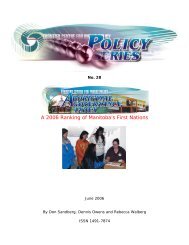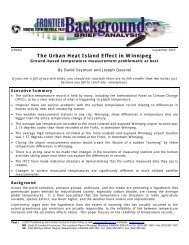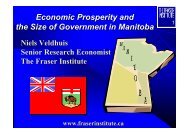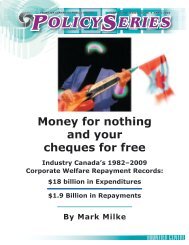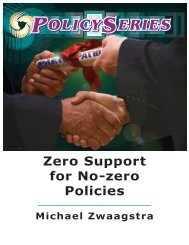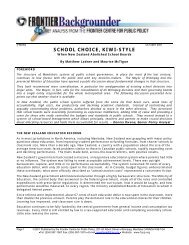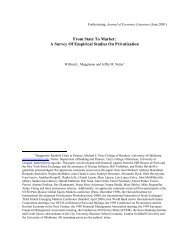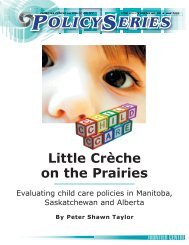View the Entire Report - Frontier Centre for Public Policy
Create successful ePaper yourself
Turn your PDF publications into a flip-book with our unique Google optimized e-Paper software.
Housing Maintenance<br />
The most visible sign of inner-city problems is <strong>the</strong> deterioration of <strong>the</strong> housing stock. This<br />
discourages ongoing maintenance, let alone increased investment. As housing becomes scarce and<br />
less desirable <strong>for</strong> families, school enrollments decline. This, in turn decreases enrollment-based<br />
funding <strong>for</strong> attractive school programs, and that fur<strong>the</strong>r discourages family residence. The coupling<br />
of low rents and poor living conditions is usually tolerated only by persons unable or unwilling to<br />
participate in ongoing self-maintenance. This leads to fur<strong>the</strong>r decline. The public, commercial, and<br />
professional life of <strong>the</strong> neighborhood <strong>the</strong>n increasingly seems to center on its concentration of<br />
poverty, addiction, abuse, ill health, and family instability.<br />
The means to prevent, and even reverse, <strong>the</strong> concentration promoted by such decline are at hand<br />
in by-laws already on <strong>the</strong> books. Standards regarding property maintenance, health, and safety<br />
already exist to address <strong>the</strong>se concerns on an ongoing basis. Application of <strong>the</strong>se policies breaks<br />
down because of inadequate staffing and funding <strong>for</strong> inspections, laxity on <strong>the</strong> part of inspectors,<br />
and <strong>the</strong> requirement of community complaints be<strong>for</strong>e proceeding.<br />
This could be effectively addressed by removing professional and union barriers to citizen<br />
participation. If mandatory community inspection teams regularly accompanied inspectors <strong>the</strong>y<br />
would be well in<strong>for</strong>med, preceded by, assisted, and accountable to those most affected by <strong>the</strong>ir<br />
work.<br />
Revenue Property Income<br />
There are many legal requirements <strong>for</strong> investment in property maintenance affecting value, health,<br />
and safety. On <strong>the</strong> o<strong>the</strong>r hand, <strong>the</strong>re is <strong>the</strong> reality of declining real-dollar revenues from controlled<br />
rents and artificially low welfare rates on <strong>the</strong> o<strong>the</strong>r.<br />
But rent control has <strong>the</strong> same emotional resonance <strong>for</strong> <strong>the</strong> poor as tax relief does <strong>for</strong> <strong>the</strong> rich. And,<br />
just as bringing government deficits under control is a prerequisite to reducing taxes, increasing<br />
<strong>the</strong> ability of low-income tenants to pay uncontrolled rents is a prerequisite <strong>for</strong> removing rent<br />
control.<br />
It is possible <strong>for</strong> a commitment to pay market rents <strong>for</strong> qualified welfare recipients to accompany a<br />
robust policy of reducing long-term welfare dependence by employable persons.<br />
Welfare Re<strong>for</strong>m<br />
The goal of welfare re<strong>for</strong>m should be to increase <strong>the</strong> ability of willing people to provide <strong>for</strong><br />
<strong>the</strong>mselves and direct <strong>the</strong>ir own lives.<br />
The disincentive to moving up to <strong>the</strong> next rung of <strong>the</strong> economic ladder can be removed by<br />
continuing to provide dental, vision and o<strong>the</strong>r such benefits based on income ra<strong>the</strong>r than an<br />
unrealistically brief time limit.<br />
Like third world colonies, hundreds of millions of dollars flow through inner city neighborhoods but<br />
little remains <strong>the</strong>re.<br />
Non-resident landlords build up equity from welfare rents but welfare recipients who choose to<br />
spend <strong>the</strong>ir payments wisely are prevented from saving, ei<strong>the</strong>r in <strong>the</strong> <strong>for</strong>m of home equity or, more<br />
ironically, in <strong>the</strong> <strong>for</strong>m of registered education savings programs. If a concerned non-parent opens<br />
an RESP, he/she does not receive <strong>the</strong> matching federal government contribution of up to<br />
$400/year available to parents. This works against <strong>the</strong> well-founded belief that education is key to<br />
overcoming poverty.<br />
Zoning<br />
A pet peeve of inner city residents is that non-resident helpers do not have to live with <strong>the</strong><br />
investment and land-use consequences of <strong>the</strong>ir solutions.<br />
Rightly applied, zoning returns authority to those affected by planning and land use decisions<br />
which, in turn, will actually encourage ra<strong>the</strong>r than encumber investors.<br />
Page 2<br />
©2002 Published by <strong>the</strong> <strong>Frontier</strong> <strong>Centre</strong> <strong>for</strong> <strong>Public</strong> <strong>Policy</strong>, 201-63 Albert Street • Winnipeg, Manitoba CANADA R3B 1G4<br />
•Tel: (204) 957-1567 Fax: (204) 957-1570 • E-mail: newideas@fcpp.org • Website: www.fcpp.org




